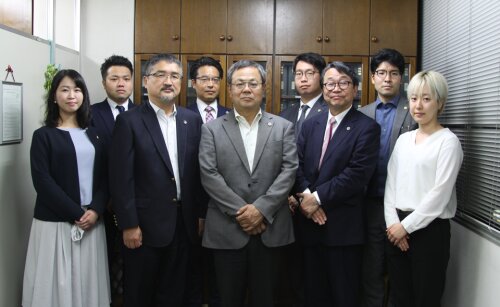Best Wrongful Termination Lawyers in Shizuoka
Share your needs with us, get contacted by law firms.
Free. Takes 2 min.
List of the best lawyers in Shizuoka, Japan
About Wrongful Termination Law in Shizuoka, Japan
Wrongful termination in Shizuoka is governed primarily by national Japanese labor law as applied within the prefecture. Japanese law favors job stability and limits employers ability to dismiss workers without proper cause and procedure. Key legal sources are the Labor Contract Act, which restricts arbitrary dismissal, and the Labor Standards Act, which sets formal requirements such as notice periods. Local government offices and labor bureaus in Shizuoka provide consultation and assistance. If an employer terminates an employee without valid reasons or without following required procedures, the dismissal may be held invalid and the employee can seek remedies such as reinstatement or compensation.
Why You May Need a Lawyer
Wrongful termination cases often involve complex factual and legal issues, and a lawyer can help in many common situations:
- Your employer gave no or inadequate notice and you were dismissed suddenly.
- You were dismissed for reasons that seem discriminatory - for example related to gender, pregnancy, disability, age, nationality, or union activity.
- You were disciplined or forced to resign following harassment, retaliation for whistleblowing, or because you complained about safety or illegal conduct - situations sometimes called constructive dismissal.
- Your dismissal conflicts with the written employment contract, collective agreement, or company rules.
- You are a fixed-term, dispatched, or part-time worker and suspect your contract was unfairly terminated or not renewed for improper reasons.
- The employer refuses to pay wages, severance promised in a contract, bonuses, or pay in lieu of required notice.
- You seek reinstatement, compensation, or a settlement but the employer refuses negotiation or engages in intimidation.
- You need help navigating administrative options, mediation, or filing a court claim while preserving evidence and meeting deadlines.
In these and similar cases, lawyers with experience in Japanese labor law can evaluate the facts, explain the legal options, draft demand letters, represent you in mediation or court, and advise on strategy such as whether to seek reinstatement or damages.
Local Laws Overview
The following legal principles are most relevant to wrongful termination in Shizuoka:
- Labor Contract Act - Article 16: A dismissal is invalid if it lacks objectively reasonable grounds and is not appropriate in general social norms. Courts apply a test of objective reasonableness and social acceptability when reviewing dismissals.
- Labor Standards Act - Notice and pay in lieu: Employers must normally give at least 30 days notice before dismissal or provide payment equivalent to 30 days wages instead of notice.
- Company rules and employment contracts: Employers must follow their own written rules, internal procedures, and contracts. Failure to do so can make a dismissal invalid.
- Discrimination and special protections: National laws prohibit unfair treatment on grounds such as gender, pregnancy, or disability. Special protections apply to pregnant employees, employees on childcare leave, and workers injured on the job.
- Fixed-term contracts and renewals: Fixed-term contracts are permitted, but repeated renewal patterns and substance of the relationship can affect whether a refusal to renew is treated as dismissal. Specific rules apply for temporary staff and dispatched workers under the Worker Dispatch Act.
- Collective dismissals and business necessity: Mass layoffs or dismissals for business reasons require careful procedures and may involve consultation with unions and reasonable selection criteria. Courts examine whether the employer exhausted alternatives and used fair selection standards.
- Remedies and procedures: Remedies include reinstatement or monetary compensation. Employees can seek negotiation, mediation through institutional channels, or bring lawsuits in civil courts. Administrative bodies and courts in Shizuoka handle consultations and disputes.
Frequently Asked Questions
What makes a dismissal "wrongful" in Shizuoka?
A dismissal is wrongful if it violates statutory protections or contract terms - for example if the employer had no objectively reasonable ground to dismiss, did not follow required company procedures, acted discriminatorily, retaliated against lawful conduct, or failed to give required notice or payment in lieu. Courts assess reasonableness and social acceptability.
How long does an employer have to give notice before firing me?
Under the Labor Standards Act employers generally must give 30 days notice or pay 30 days wages in lieu of notice. There are limited exceptions for urgent misconduct that justifies immediate dismissal, but such cases require strong justification.
Is there a legal right to severance pay?
There is no general statutory right to severance pay in Japan. Severance obligations arise from employment contracts, company policies, collective agreements, or good-faith negotiation. If dismissal is found unlawful, courts may order compensation for lost wages.
Can I be reinstated to my job if my dismissal is found wrongful?
Yes. Courts or negotiated settlements may result in reinstatement where appropriate. However, reinstatement is not always practical or desirable, and many cases settle with monetary compensation instead. A lawyer can advise which remedy is most realistic.
What kind of evidence helps prove wrongful termination?
Useful evidence includes employment contracts, company rules, written warnings, emails and messages, pay slips, attendance records, performance evaluations, witness statements, and any records of complaints or requests you made. Keep a detailed timeline of events and copies of all documents.
How long do I have to take action after being dismissed?
Time limits vary by claim and remedy, and specific statutory limitation periods can apply. Because deadlines can be short and procedural steps important, you should act promptly and consult a lawyer or local labor consultation service as soon as possible.
Can I get help from a union or labor office in Shizuoka?
Yes. If you belong to a union, the union can support collective action, negotiation, or filing unfair labor practice complaints. Local labor consultation services and the Shizuoka labor bureaus also offer advice and can guide you to mediation or administrative channels.
What are my options if I was forced to resign because of harassment?
Forced resignation can be treated as constructive dismissal if the employer created intolerable conditions that effectively forced you to quit. Options include negotiation with the employer, claims for damages, or seeking remedies through courts or administrative mediation. Document the harassment and any complaints you made to management.
My employer says the dismissal was for business reasons - is that valid?
Dismissing for business reasons can be valid if the employer demonstrates genuine business necessity, efforts to avoid dismissals, fair selection criteria, and reasonable procedures. Japanese courts scrutinize such claims closely - simple business troubles do not automatically justify dismissals without proper steps.
Should I try mediation or go straight to court?
Mediation or negotiation is often a faster and less costly way to resolve disputes, and it can preserve confidentiality and working relationships. Court action may be necessary if negotiations fail or the employer refuses reasonable remedies. A lawyer can help assess the chances of success in mediation versus litigation and recommend a strategy.
Additional Resources
When seeking help in Shizuoka, consider these local and national resources:
- Shizuoka Prefectural Labor Bureau and local labor sections for consultation and information on labor law enforcement.
- Shizuoka Labor Standards Office for questions about notice, wages, and standards under the Labor Standards Act.
- Hello Work offices for employment support and consultation on employment matters.
- Shizuoka Bar Association for referrals to lawyers who specialize in labor and employment law.
- National Ministry of Health, Labour and Welfare publications and guidance on labor rights and laws.
- Trade unions and workers organizations for collective support and negotiation assistance.
- Local city or ward labor consultation services, which often provide free initial advice and can point you to the right administrative procedure.
Next Steps
Follow these practical steps if you believe you were wrongfully terminated in Shizuoka:
- Preserve evidence - collect contracts, pay slips, emails, warnings, and make a written timeline of events.
- Write a brief record of conversations and meetings, noting dates, times, witnesses, and what was said.
- Seek immediate advice from a labor consultation office, union representative, or a qualified lawyer. Early advice helps protect rights and meet deadlines.
- Consider sending a formal demand letter through a lawyer to request reinstatement, payment, or compensation if appropriate.
- Explore mediation or administrative consultation as initial steps - these can lead to faster, lower-cost resolutions.
- If mediation fails, prepare for possible litigation. Your lawyer will explain the likely remedies, possible timeline, and costs.
- Keep personal finances and job-search options in mind while resolving the dispute - contact Hello Work if you need assistance finding new employment.
Getting professional legal advice early improves your chances of a favorable outcome. A local labor lawyer familiar with Shizuoka practices can assess your case, explain the best route - negotiation, administrative remedies, or court - and represent your interests through the process.
Lawzana helps you find the best lawyers and law firms in Shizuoka through a curated and pre-screened list of qualified legal professionals. Our platform offers rankings and detailed profiles of attorneys and law firms, allowing you to compare based on practice areas, including Wrongful Termination, experience, and client feedback.
Each profile includes a description of the firm's areas of practice, client reviews, team members and partners, year of establishment, spoken languages, office locations, contact information, social media presence, and any published articles or resources. Most firms on our platform speak English and are experienced in both local and international legal matters.
Get a quote from top-rated law firms in Shizuoka, Japan — quickly, securely, and without unnecessary hassle.
Disclaimer:
The information provided on this page is for general informational purposes only and does not constitute legal advice. While we strive to ensure the accuracy and relevance of the content, legal information may change over time, and interpretations of the law can vary. You should always consult with a qualified legal professional for advice specific to your situation.
We disclaim all liability for actions taken or not taken based on the content of this page. If you believe any information is incorrect or outdated, please contact us, and we will review and update it where appropriate.










